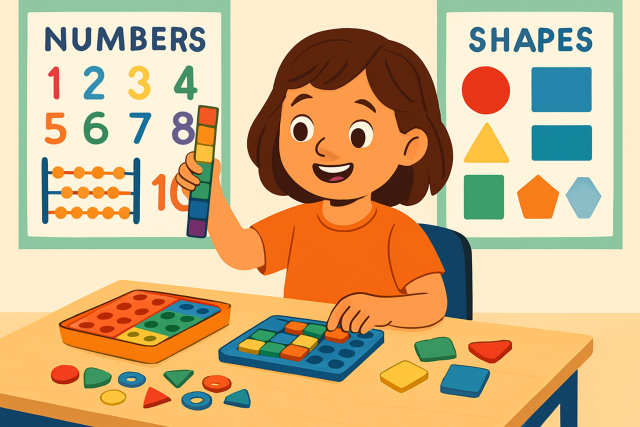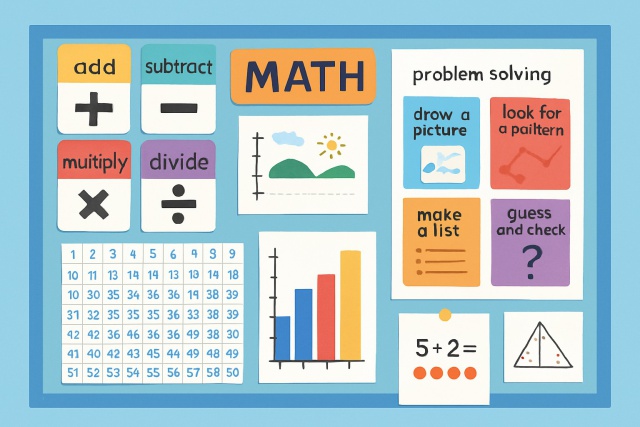Math Workshop - Steps To Build Confident Problem Solvers

A math workshop sets the stage for an interactive experience where students quietly build confidence as problem solvers through hands-on, student-focused activities. It emphasizes engagement and exploration, gently guiding learners to deepen their understanding.
Traditional math lessons often lean heavily on lectures and memorization which can leave many students feeling bored or stressed when they have to solve problems. This old-school method misses the mark on building critical thinking and persistence skills that help students face new challenges with more confidence. Math workshops flip the script by offering interactive student-driven experiences where learners roll up their sleeves and bounce ideas off each other while learning through trial and error—all within a supportive environment.
Getting to Know the Math Workshop Model with a Friendly Introduction
A math workshop takes a refreshingly flexible and interactive approach to teaching. It mixes whole-group mini-lessons, hands-on activities, group collaboration and time for reflection. Rather than sticking to the usual classroom routine, it focuses on student independence and personalized instruction. This allows students to move along at their own rhythm.
- Learning that hands the keys over to students encouraging them to really take the wheel of their math journey
- Instruction tailored to fit the unique skills and needs of each learner because one size just doesn’t cut it
- Partnering up with classmates to swap strategies and dig deeper into understanding—think of it as team problem-solving with a splash of friendly debate
- Engaging hands-on activities that blend manipulatives and technology to bring concepts to life in a way that sticks
- Carving out time to pause and reflect giving students a chance to mull over their thinking and cement what they’ve picked up along the way
Running math workshops works wonders for students by boosting their problem-solving skills through exploration and lively discussion with a healthy dose of persistence. As they dive deeper into math, students often find their confidence growing and it’s not just about getting to the answer.
Step 1 Getting Your Math Workshop Ready for Success
Setting up a welcoming and well-organized space really makes a world of difference when running a successful math workshop. Whether you are working with a physical room or a virtual one, the environment should invite interaction and keep materials within easy reach. It should also support both group activities and solo work effortlessly.
- Math manipulatives like blocks, fraction circles and pattern tiles that invite hands-on learning and make abstract concepts more tangible
- Small whiteboards or lapboards where students can roll up their sleeves and work through problems while sharing ideas with the group
- Technology tools such as tablets or interactive apps designed to boost math practice and keep engagement high
- Posters that gently nudge a growth mindset and spotlight key math vocabulary turning the walls into a quiet cheer squad
- Seating arrangements that stay flexible encouraging comfy collaboration and making it easy for everyone to move around
- Storage bins or clearly labeled containers to keep materials organized because a tidy space helps tidy the mind
- A dedicated space for mini-lessons or group discussions perfect for moments when focus and conversation need to blend seamlessly
Step 2 Designing Math Activities That Truly Engage and Really Stand Out
Craft activities that really hit home with what students already get, then build on that foundation while serving up just enough of a challenge to nudge them forward.
- Problem-solving activities that invite some good old-fashioned careful thinking and often call for a few thoughtful steps to get to the heart of things
- Math games crafted to ignite friendly competition and quietly sharpen skills you’ll actually use
- Group challenges that sneak in teamwork and communication practice to make collaboration feel less like work and more like a game
- Hands-on explorations using manipulatives bring abstract ideas down to earth and help them click in a way that’s actually fun
- Real-life examples cleverly connect math to everyday situations to make numbers feel less intimidating and more relevant
Include open-ended problems that don’t have just one right answer to encourage students to experiment with different strategies and build a bit of tenacity along the way. These tasks not only spark critical thinking but also give learners a chance to mull over their approaches and put their reasoning into words.
Step 3 Putting Effective Grouping Strategies into Action Because Ideas Need to Meet Somewhere
Mixing things up with different group setups—whether pairs, small groups, or whole-class discussions—usually does wonders for peer learning and offers students a variety of support styles.
- Grouping students by ability can really help tailor instruction to their needs but sometimes risks pigeonholing them with labels
- Mixed-ability groups often spark unexpected peer learning and bring a colorful mix of viewpoints
- Organizing by interest usually cranks up motivation since everyone is fired up about a shared passion
- Letting students pick their own groups gives them a sense of control but clear guidelines are key to keeping things on track and avoiding chaos
Encouraging positive teamwork and accountability is best done by setting clear expectations and straightforward guidelines for group work. Handing out roles like recorder, reporter and facilitator can really help keep everyone engaged and on their toes. Regular check-ins are worth their weight in gold for keeping the project running smoothly.
Step 4 Nurturing a Growth Mindset and Embracing Mathematical Discussions
Creating a math workshop environment where mistakes are not just tolerated but welcomed—and where students feel comfy sharing their thought processes—really helps nurture a growth mindset. When people dive into purposeful mathematical conversations, it often sparks a richer understanding.
- Encourage a healthy appetite for risk-taking by celebrating effort and persistence, not just the right answers. It’s often the climb that counts, not the peak
- Welcome mistakes as golden chances to dig deeper and figure out what really went sideways
- Toss out thoughtful questions like “What makes you say that” or “Could you walk me through your thinking” to spark meaningful dialogue
- Provide handy sentence starters to nudge math conversations along such as “I noticed that...” or “One approach I tried was...” — little nudges go a long way
- Lead by example and coach students in having productive conversations by restating and genuinely acknowledging their ideas. It’s like giving their thinking a warm hug
"> "Mistakes often open the way to new insights." – James Joyce
Encouraging students to embrace their slip-ups, take a thoughtful pause to reflect, and then push forward is absolutely key in shaping confident, capable problem solvers. I have found that these little stumbles can be the best teachers when we let them be.
Step 5 Evaluating and Thinking Carefully About Student Progress Taking a Closer Look at How They are Really Doing
Ongoing formative assessment during math workshops gives you a real-time window into how students are wrapping their heads around concepts, and it plays a key role in fine-tuning your teaching approach.
- Observation checklists to keep an eye on how students engage and put strategies into play
- Student self-assessments where learners take a moment to reflect on their own confidence and progress—kind of like a little personal check-in
- Exit tickets featuring brief questions designed to quickly gauge understanding before the bell rings
- Math journals that encourage some thoughtful reflections on their problem-solving adventures
- One-on-one conferences that provide personalized feedback and a chance to set meaningful goals, making the whole process a bit more human and connected
Regular reflection sessions give students a valuable chance to really dig into how they tackle problems and nudge them to set goals that actually mean something. This kind of metacognitive practice not only fosters a genuine sense of ownership but also sharpens their skills.
Step 6 Navigating Common Challenges in Math Workshops (Because they’re as inevitable as Monday mornings)
Time limits and students dragging their feet at new approaches often turn running effective math workshops into a tightrope act. Juggling balanced participation adds to the challenge.
- Set up and practice clear routines to make the most of your instructional time because every minute counts
- Use scaffolded support like guided questions and checkpoints to gently guide learners who might find the material tricky at first
- Implement targeted interventions for students who need extra help to give them a well-deserved boost
- Encourage students to share their ideas freely while keeping the class on track with calm management. It is no small feat but worth the effort
- Rotate group roles and responsibilities so everyone gets a fair shot at participating and feeling valued
Keep your math workshop students engaged by switching up activities now and then, giving feedback when it counts, and acknowledging little victories along the way.
Handy Resources to Steer You Smoothly Through Your Math Workshop
- "Math Workshop: Five Steps to Implementing Guided Math" by Jennifer Lempp, a practical hands-on guide that teachers swear by
- The National Council of Teachers of Mathematics (NCTM) website, a treasure trove packed with resources and lesson plans that never run dry
- Hands-on math manipulative sets from Learning Resources, well-loved for their solid quality and variety
- Digital platforms like Khan Academy and Desmos, which mesh perfectly with instruction and offer engaging interactive practice
- Growth mindset posters and classroom decorations available at educators' supply stores, great for adding inspiration to any math corner
- Math journal notebooks designed to gently nudge students toward reflecting on their learning journey
- YouCubed.org, a site dedicated to sparking math engagement through clever problem-solving and mindset strategies—definitely worth a peek
- Virtual math games and simulations like those found on Prodigy or Reflex Math, perfect for supporting differentiated learning that keeps students on their toes






